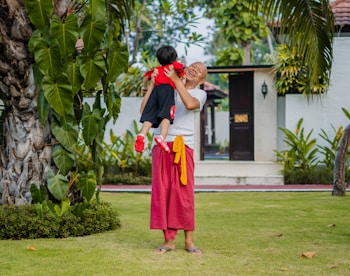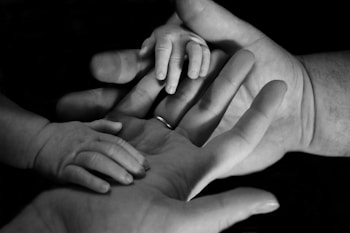 Family-related Spanish Words
Family-related Spanish Words
A collection of Spanish words that are associated with family members and relationships.

(hermanos) gemelos
(Hermanos) gemelos in Spanish translates to (brothers) twins in English. This is often used to refer to a pair of brothers who are twins, meaning they were born at the same time from the same pregnancy. The word 'hermanos' specifically refers to 'brothers', and 'gemelos' to 'twins'. In a broader context outside of family, 'gemelos' can also be used to describe two things that are identical or very similar in appearance.
Los hijos
In Spanish, 'los hijos' means 'the children', and it represents any person who is under the age of adulthood. A child commonly refers to a son or daughter at any age. Children are considered great blessings in Spanish cultures.
Example sentences with Los hijos →Los tíos
'Los tíos' directly translates to 'the aunts and uncles' in English. Spanish cultures maintain a strong emphasis on the extended family, often including aunts and uncles in family gatherings and important occasions.
Example sentences with Los tíos →Tio/Tia
In Spain, 'tio' and 'tia' are commonly used informally to refer to a man or woman, similar to 'dude' in English.
Example sentences with Tio/Tia →
abuelo
The Spanish word 'abuelo' is translated to English as 'grandpa'. The term 'abuelo' is a familiar and affectionate way to refer to a male grandparent in Spanish-speaking cultures, encompassing both paternal and maternal grandfathers. The term is widely used in all Spanish-speaking countries and regions, making it a common term in the Spanish language. An 'abuelo' is an older male family member, specifically the father of one's own parents, who traditionally plays a role of works as a source of wisdom and guidance in the family.

adolescente
The word 'adolescente' in Spanish is an adjective or noun that translates to 'teen' in English. It refers to an individual who is in the age range between childhood and adulthood, generally between the ages of 13 and 19. The term can be used to indicate both male and female individuals in this age group, and it's also used to describe the phenomena, changes and characteristics typical of this age stage.

adoptar un niño
The Spanish phrase 'adoptar un niño' translates to 'adopt a child' in English. This phrase is often used to refer to the process of legally taking another's child and bringing it up as one's own. The act of adoption comes with all the legal rights and responsibilities of parenthood. This phrase could be utilized in many different contexts, such as discussing family matters, demographic policies, and social services. The verb 'adoptar' refers to the action of adopting, while 'un niño' stands for a child.

antepasados
The Spanish word 'antepasados' translates to 'ancestors' in English. Ancestors are people from whom other people are descended, especially those more remote than a grandparent; they are our forefathers, predecessors or foregone generations. The term highlights a sequence of family descent and bloodline. In more general sense, 'antepasados' can also refer to pervious or ancient members of a community, species or a group of any individuals.

aumentar la familia
The phrase 'aumentar la familia' in Spanish directly translates to 'increase the family' in English. However, in context, it is usually used to refer to the idea of having more children or adding more members to the family, similar to the English phrase 'expanding the family'.
bebé
The word 'bebé' in Spanish is used to refer to a very young child, especially one newly or recently born. It can also be used to refer to someone in an affectionate way. However, it is primarily used to mean a baby or infant. Context matters with this word as it changes meaning based on the conversation.
Example sentences with bebé →
bisnieto
The Spanish word 'bisnieto' translates to 'great-grandson' in English. It is primarily used to refer to the grandson of one's son or daughter. The prefix 'bis-' indicates a two-generation gap, similar to how 'great-' functions in English genealogy terminology. This term can also be used in a compound form with additional 'bis-' prefixes to denote further generations, although such use is less common.
Example sentences with bisnieto →casa
'Casa' in Spanish means house. This is a building for human habitation, especially one that consists of a ground floor and one or more upper storeys.
Example sentences with casa →
casado
The Spanish word 'casado' translates to 'married' in English. It is used to describe the marital status of a person. For instance, if a man is married, he will be described as 'casado'. This word is used specifically in contexts where marital status is relevant.
compadre
In many Spanish cultures, this term is used to refer to a close friend or comrade. It directly translates to 'godfather', indicating a level of shared support and respect.
Example sentences with compadre →
crear una familia
The Spanish phrase 'crear una familia' translates to 'create a family' in English. This phrase generally refers to the idea of starting a family, often through marriage and having children. It can symbolize the establishment of a new household and can be associated with notions of love, responsibility, commitment and care.

cuñado
The Spanish word 'cuñado' translates to 'brother-in-law' in English. In specific cultural context, it is used to refer to the husband of one's sibling or the brother of one's spouse. Similar to English, it's often used in familial conversations and discussions referring relationships among family members.

cónyuge
The Spanish word 'cónyuge' translates to 'spouse' in English. It is a gender-neutral term that can refer to a husband or a wife. The term is used in a legal context, often in relation to marriage contracts or laws, and can also be used more generally to refer to someone's partner in marriage. 'Cónyuge' has its root in the Latin word 'coniux', which also means spouse.

divorciado
The Spanish word 'divorciado' translates to 'divorced' in English. It is used to describe a person who has legally ended their marriage. Like in English, it can be used as both a noun and an adjective. For instance, a man who is divorced can be described as a 'hombre divorciado', and a divorced woman as a 'mujer divorciada'. The word ‘divorciado’ derives from the verb 'divorciar', which simply means 'to divorce'.

divorciarse
The term 'divorciarse' in Spanish translates to 'divorce' in English. It is a verb that refers to the legal dissolution of a marriage by a court or other competent body. It's an action where two people decide to legally end their marriage. Both single and married individuals use this term when talking about ending marriage relationships. Please note, it is a reflexive verb in Spanish, which means it is often used with reflexive pronouns like 'me', 'te', 'se', 'nos', 'os', 'se'. For example, 'Ella se va a divorciar' translates to 'She is going to get a divorce'.

divorcio
The Spanish word 'divorcio' translates to 'divorce' in English. It is a noun and refers to the legal dissolution of a marriage by a court or other competent body. Divorcio is used in various contexts, but primarily in legal and personal discussions regarding the end of a marriage. It is a common term in family law, and its understanding and application are vital in such settings.

esperar un hijo
The Spanish phrase 'esperar un hijo' directly translates to 'expect a child' in English. It is commonly used to describe a situation where a person (or couple) is anticipating the birth of a child. For example, a pregnant woman or man whose partner is pregnant would use this phrase. It conveys not just the action of waiting, but also the excitement, hope, and preparation that come with the anticipation of a new baby.
esposo
The word 'esposo' is used in Spanish to refer to a spouse who is a man or male partner in a marital relationship. The term 'esposo' is extensively used in both formal and colloquial contexts. Synonyms for 'esposo' can include 'marido' but 'esposo' is most universally understood.
Example sentences with esposo →
estado civil
The Spanish phrase 'estado civil' translates to 'marital status' in English. It refers to the formal ranking, recognized by the society and law, that an individual holds in terms of his or her relationship commitment. This status could indicate whether the person is single, married, divorced, widowed, separated, etc. It is often used in official documents and forms.

estar de canguro
The Spanish phrase 'estar de canguro' translates to 'babysitting' in English. It is a colloquial expression often used in Spain, and its literal translation is 'to be as a kangaroo'. This is in relation to how kangaroos carry their young in their pouch, analogous to taking care of children. It is used when someone is temporarily taking care of someone else's child or children.

estar embarazada
The term 'estar embarazada' in Spanish directly translates to 'being pregnant' in English. It is used to indicate that a woman is carrying an unborn child in her uterus. The verb 'estar' implies a temporary state in Spanish, so the phrase translates to 'being pregnant', emphasizing the temporary state of pregnancy.

estar en familia
'Estar en familia' is a Spanish phrase that translates to 'being in family' in English. It is used to convey the sense of togetherness or unity among family members. It denotes spending quality time or being together with one's family, and often implies a feeling of comfort, love, and affection within the family unit. This phrase is widely used in both formal and informal contexts in Spanish conversations.

ex marido
The Spanish word 'ex marido' translates to 'ex-husband' in English. It is used to refer to a man to whom someone was formerly married, similar to how the term 'ex-husband' is used in English. Typically, it refers to a previous partner in a dissolved marriage.

ex mujer
The Spanish term 'ex mujer' translates to 'ex-wife' in English. It is used to refer to a woman to whom one was formerly married. The term describes a past marital relationship that has been legally ended through divorce. As such, an ex-wife once held the role of a legal spouse but currently holds a different status, denoted by the prefix 'ex' which signifies a past association.

familia monoparental
The term 'familia monoparental' is a Spanish phrase that refers to a family structure that is headed by a single parent. This can occur due to various reasons such as the death of a partner, divorce, break-up, or choice. The single parent is responsible for providing and caring for the child or children both financially and emotionally. Despite the difficult challenges single parents face, many manage to provide a loving and nurturing environment for their children.

familia numerosa
The Spanish expression 'familia numerosa' translates to 'large family' in English. This phrase is often used to describe a family with many members, typically more than the norm. It can range from a family with several children, to extended family living under the same roof. 'Familia numerosa' could refer to the notion that the larger the family, the more joyful and lively the atmosphere can be, because each member adds their personality, influence and dynamics. It is regardless of whether the large family is by birth, by marriage, or by choice, applying to blended and adopted families as well.